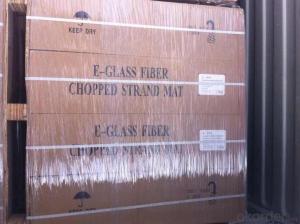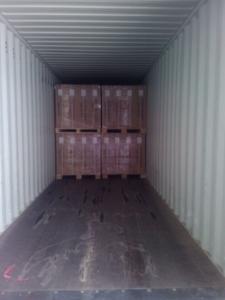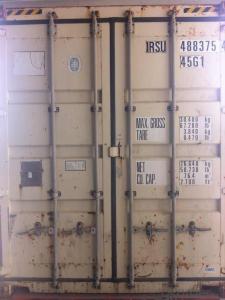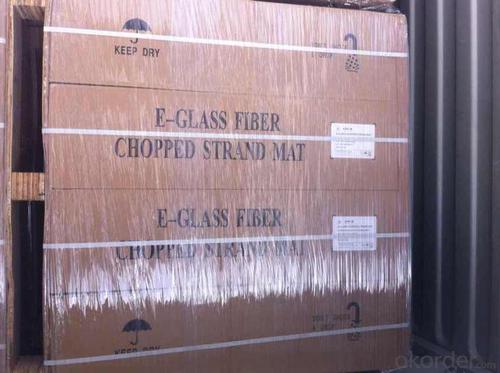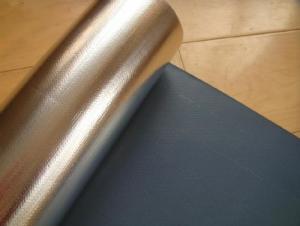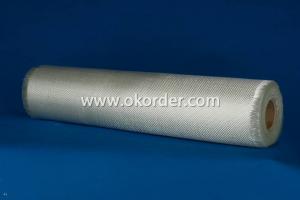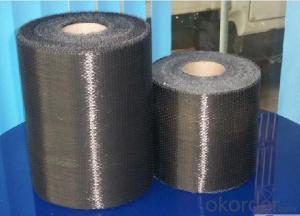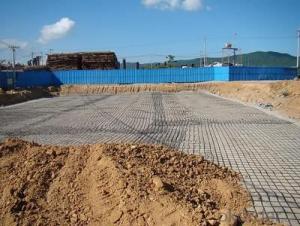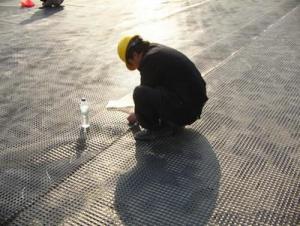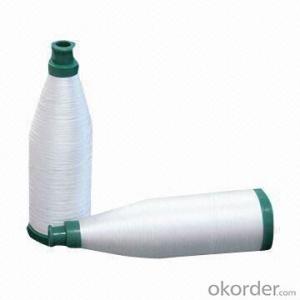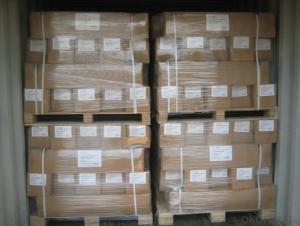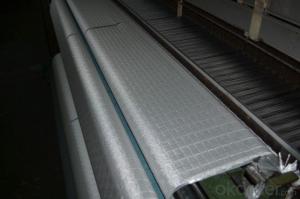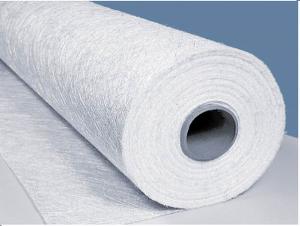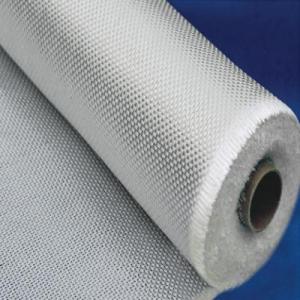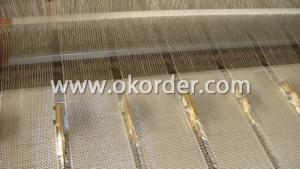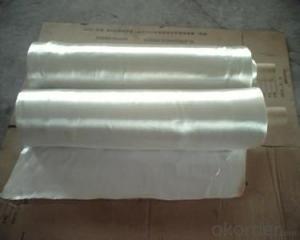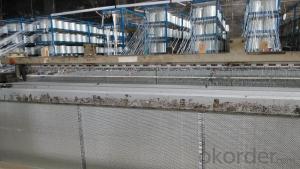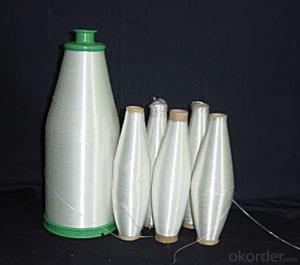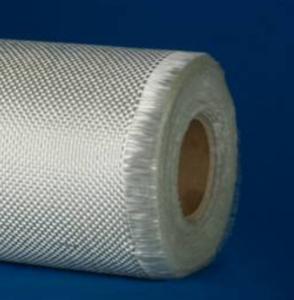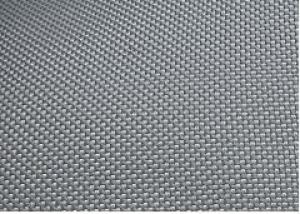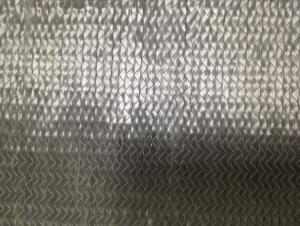Fiberglass Fabrics - E-Glass CSM 450gsm 1040 Width Best Price
- Loading Port:
- China Main Port
- Payment Terms:
- TT or LC
- Min Order Qty:
- 2000 kg
- Supply Capability:
- -
OKorder Service Pledge
OKorder Financial Service
You Might Also Like
Product Description
1.E-glass CSM 450gsm is made of randomly dispersed strands with power or emulsion bonded.
2.Applicable for hand lay-up ,continuous lamination process. Compatible with UP,VE.
3.Suitable for transparent panels,ship bodies,automobile parts and interior decorations ,etc.
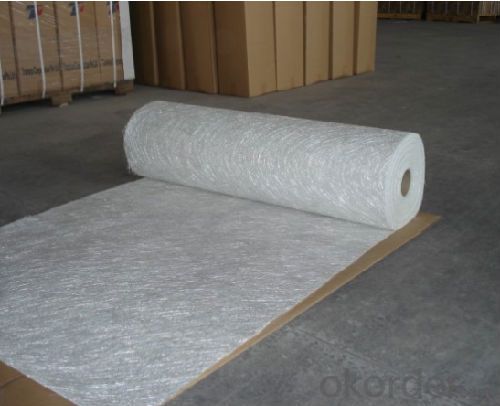
Specifications:
E,C Specification | Weight g/m | Breaking strength N/150mm | Speed of impregnations | Package Weight (kg) |
E-MC100 | 100 | 30 | 60 | 20 |
E-MC200 | 200 | 30 | 180 | 30 |
E-MC350 | 300 | 43 | 180 | 30 |
E-MC450 | 450 | 60 | 180 | 30 |
E-MC600 | 600 | 80 | 180 | 30 |
Characteristics
1.Consistent thickness and stiffness.
2.Rapid impregnating and good compatibility with resin.
3.Superior wet through with less air trap.
4.Good mechanical properties and high strength of parts.
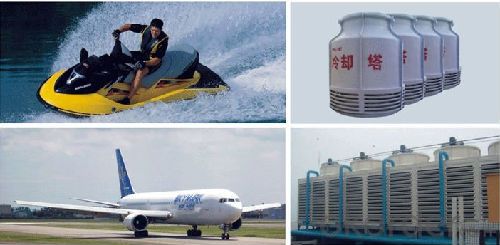 Packaging&Storage
Packaging&Storage
Each roll is packed by polyester bag,and then put into a cardboard box or plastic wowen bag.The weight of each roll is between 20 to 85 Kg, The rolls are to be horizontally placed and could be in bulk or on pallet.Optimum storage conditions are between the temperature of 5~35℃ and with the humidity between 35%~65%.The product should be used within 12 months from the time of delivery and remain in theiroriginal packaging until just prior to use.
FAQ:
1.What is the delivery time ?
15days after receiving the deposit
2.Are you a trading company or factory.
We are factory,and we have more than 10 years of experience.
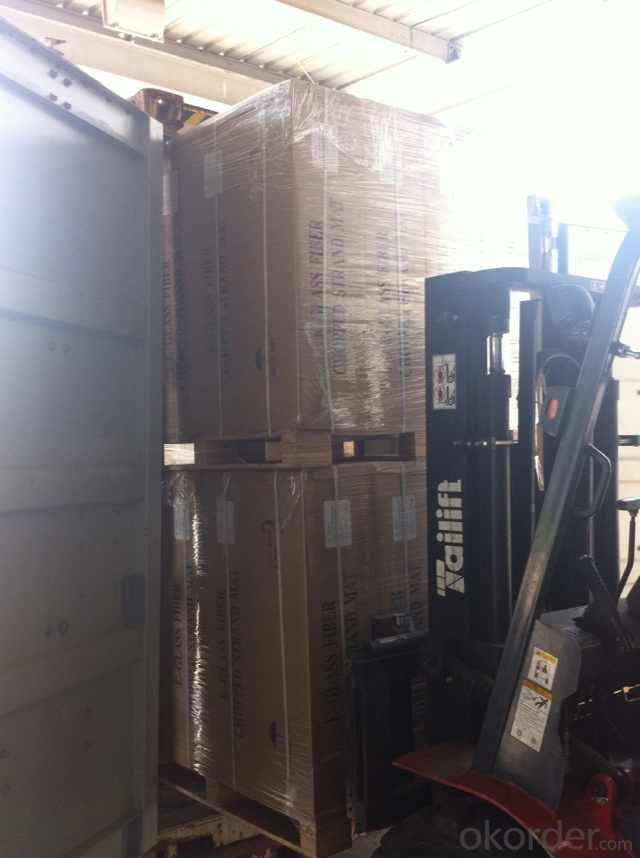
- Q: Is fiberglass fabric resistant to chemical degradation?
- The excellent resistance to chemical degradation exhibited by fiberglass fabric is well-known. Its composition of glass fibers, which are impervious to most chemicals, allows it to withstand the effects of various corrosive substances with high resistance. Fiberglass fabric can endure exposure to acids, alkalis, solvents, oils, and other chemicals commonly present in industrial environments without experiencing significant degradation. This quality makes it the preferred choice for applications where chemical resistance is of utmost importance, such as in the manufacturing of chemical storage tanks, pipes, and linings. Furthermore, the durability and longevity of fiberglass fabric are also enhanced by its resistance to chemical degradation, making it a dependable material for a wide range of industrial and commercial uses.
- Q: Can fiberglass fabric be used for making tarpaulins?
- Yes, fiberglass fabric can be used for making tarpaulins. Fiberglass fabric is known for its durability, strength, and resistance to harsh weather conditions. It is commonly used in various applications, including the production of tarpaulins. The fiberglass fabric is lightweight yet has excellent tear resistance and can withstand high temperatures. It is also waterproof, making it an ideal material for protecting goods and equipment from rain, snow, and other environmental factors. Additionally, fiberglass fabric is resistant to chemicals, UV rays, and mildew, enhancing its longevity and performance as a tarpaulin material.
- Q: Rural cement flat roof room, how to do waterproof, anti leakage best?
- The surface of the base is cleaned up, the water content is not more than 9%, the formation is dense, and the joints of each node are tidy and complete, and meet the requirements.
- Q: What are the different fabric coatings available for fiberglass fabric?
- There are several different fabric coatings available for fiberglass fabric, each offering unique properties and benefits. Some of the most common types of fabric coatings for fiberglass fabric include: 1. Silicone Coating: Silicone coatings provide excellent resistance to high temperatures and are often used in applications where heat protection is critical, such as insulation blankets or protective covers for machinery. Silicone-coated fiberglass fabric also offers good chemical resistance and can be used in environments with exposure to oils, solvents, and corrosive substances. 2. Polyurethane Coating: Polyurethane coatings provide a flexible and durable finish that enhances the fabric's performance and lifespan. This coating offers excellent resistance to abrasion, water, and chemicals, making it suitable for various applications, including flexible ducting, conveyor belts, and protective clothing. 3. PTFE (Polytetrafluoroethylene) Coating: PTFE coatings, commonly known as Teflon coatings, are popular for their non-stick properties. This coating provides excellent release characteristics, making it ideal for applications such as conveyor belts, release sheets, and non-stick surfaces for heat sealing and packaging equipment. 4. Acrylic Coating: Acrylic coatings offer good resistance to UV radiation, weathering, and mildew. This makes them suitable for outdoor applications such as awnings, canopies, and outdoor furniture coverings. Acrylic-coated fiberglass fabric also provides a smooth surface finish and is often used in signage and advertising displays. 5. Neoprene Coating: Neoprene coatings provide excellent resistance to oil, chemicals, and moderate temperatures. This coating is commonly used in applications that require protection against abrasion, such as flexible connectors, expansion joints, and gaskets. These are just a few examples of the different fabric coatings available for fiberglass fabric. The choice of coating depends on the specific requirements of the application, including temperature resistance, chemical resistance, flexibility, and durability. Consulting with a fabric specialist or manufacturer can help determine the most suitable coating for a particular application.
- Q: Can fiberglass fabric be used for insulation in nuclear power plants?
- Yes, fiberglass fabric can be used for insulation in nuclear power plants. Its excellent thermal insulation properties, fire resistance, and low thermal conductivity make it a suitable choice for insulating various components and systems in nuclear power plants.
- Q: What are the different weights of fiberglass fabric?
- Fiberglass fabric, also referred to as fiberglass cloth, can be found in a variety of weights or thicknesses. The weight of the fabric is determined by measuring the ounces per square yard (oz/yd²) or grams per square meter (g/m²). The range of weights for fiberglass fabric typically spans from 3 oz/yd² (102 g/m²) to 50 oz/yd² (1695 g/m²). The weight of the fiberglass fabric plays a significant role in determining its strength, durability, and suitable applications. For applications that require flexibility, such as boat building, surfboard manufacturing, and automotive parts, lighter weight fiberglass fabrics (3-6 oz/yd² or 102-204 g/m²) are commonly used. These fabrics are also appropriate for repairs and smaller projects. Medium-weight fiberglass fabrics (7-20 oz/yd² or 238-680 g/m²) are often chosen for general-purpose applications like laminating, molding, and reinforcing structures. They offer a good balance between strength and flexibility, making them well-suited for a wide range of projects, including composite manufacturing, construction, and aerospace applications. On the other hand, heavier weight fiberglass fabrics (21-50 oz/yd² or 714-1695 g/m²) are employed in applications that require exceptional strength and rigidity. These fabrics are frequently used in industries such as marine, wind energy, and infrastructure, where materials with high-strength properties are necessary to withstand intense conditions and structural loads. It's worth noting that the specific weight of fiberglass fabric may vary depending on the manufacturer and the intended application. Therefore, it is always advisable to consult the product specifications provided by the manufacturer to ensure the appropriate weight is selected for a specific project.
- Q: Can fiberglass fabrics be used for geotextile applications?
- Yes, fiberglass fabrics can be used for geotextile applications. Geotextiles are permeable fabrics used in civil engineering projects to stabilize soil, control erosion, and provide separation between different soil layers. While traditional geotextiles are typically made of synthetic materials like polyester or polypropylene, fiberglass fabrics can also be used effectively for these applications. Fiberglass fabrics offer numerous advantages for geotextile applications. Firstly, they have high tensile strength, meaning they can withstand significant loads and provide long-lasting stability. Additionally, fiberglass fabrics are resistant to chemicals, UV radiation, and biological degradation, making them suitable for various environmental conditions. Furthermore, fiberglass fabrics have excellent dimensional stability, meaning they will not shrink or expand significantly when exposed to moisture or temperature variations. This characteristic is crucial for maintaining the integrity and effectiveness of geotextiles over time. Another benefit of using fiberglass fabrics for geotextile applications is their excellent filtration properties. They can effectively prevent the migration of fine particles while allowing water to pass through, reducing the risk of soil erosion and maintaining water drainage. In conclusion, fiberglass fabrics can indeed be used for geotextile applications. Their high tensile strength, chemical resistance, dimensional stability, and filtration properties make them a suitable choice for various civil engineering projects where geotextiles are required.
- Q: Are fiberglass fabrics resistant to UV degradation when exposed to outdoor sunlight?
- Generally, fiberglass fabrics display resistance to UV degradation while being exposed to outdoor sunlight. Fiberglass is renowned for its exceptional UV radiation resistance, which renders it a favored option for outdoor uses. The fabric's composition and manufacturing process contribute to its ability to withstand the detrimental impacts of sunlight, thereby preserving its mechanical properties over time. Nevertheless, it is crucial to acknowledge that prolonged direct sunlight exposure may still induce some fading or discoloration. To ensure extended durability, it is advisable to apply UV-resistant coatings or finishes on fiberglass fabrics when they will be consistently subjected to intense sunlight.
- Q: Is fiberglass fabric resistant to UV discoloration?
- Yes, fiberglass fabric is generally resistant to UV discoloration.
- Q: What about the leaking water made of fiberglass cloth?
- The principle and main street "in the way of roof leaks" principle is similar.
Send your message to us
Fiberglass Fabrics - E-Glass CSM 450gsm 1040 Width Best Price
- Loading Port:
- China Main Port
- Payment Terms:
- TT or LC
- Min Order Qty:
- 2000 kg
- Supply Capability:
- -
OKorder Service Pledge
OKorder Financial Service
Similar products
Hot products
Hot Searches
Related keywords
